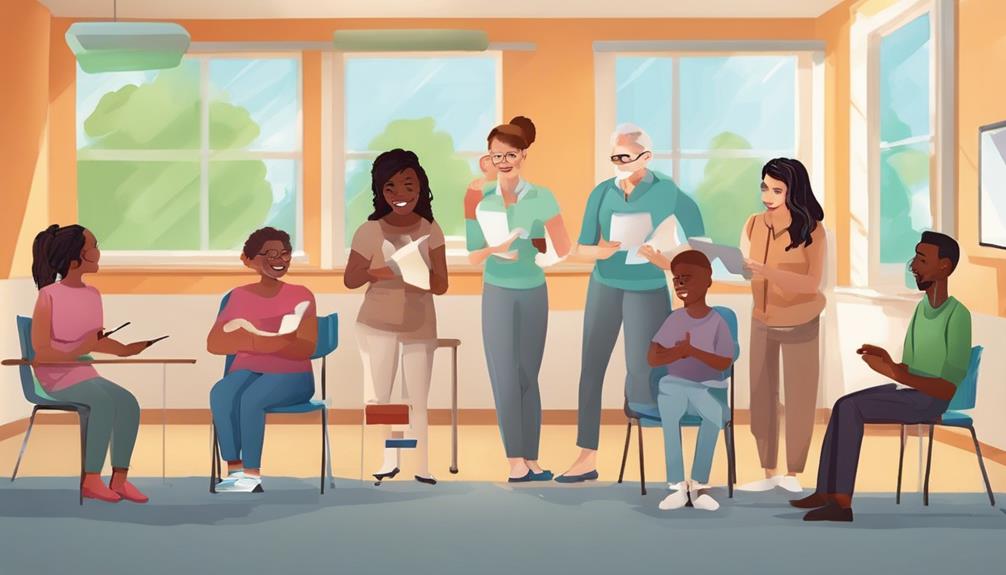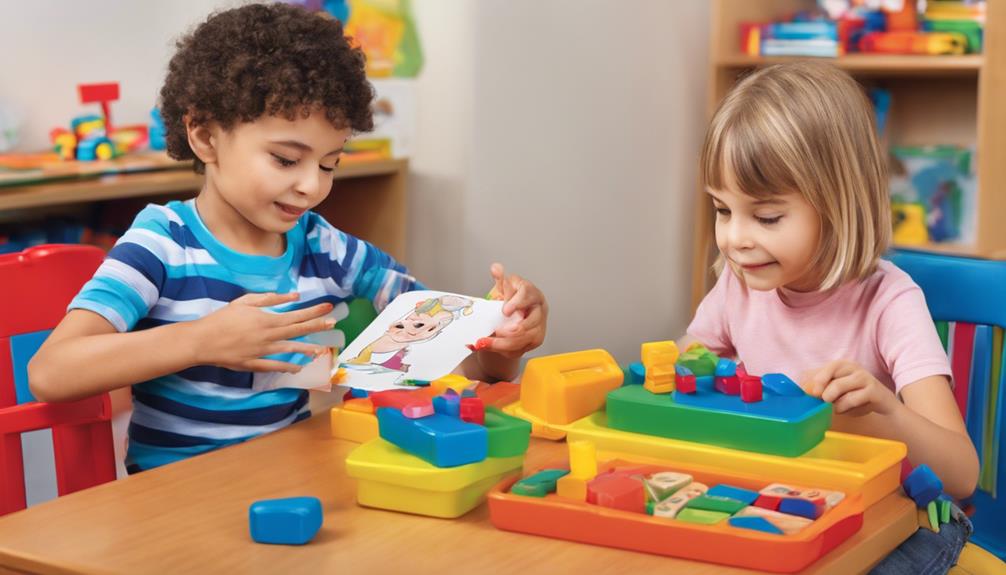As we navigate the vast ocean of online auditory-verbal therapy training programs, the search for the top three contenders can be akin to finding a beacon in a storm.
These programs offer a beacon of hope for those seeking comprehensive training in this specialized field. Whether you're a seasoned professional looking to enhance your skills or a newcomer eager to make a difference, these top three programs promise to elevate your expertise and impact in working with deaf children and their families.
Curious to discover which programs made the cut and why?
Key Takeaways
- Comprehensive curriculum covering auditory development, language acquisition, and parent coaching.
- Advanced virtual simulations, real-life case studies, and family counseling strategies for practical application.
- Interactive simulations, personalized guidance, community networking, and detailed performance assessments.
- Focus on language development, impactful therapy, certification, and progress tracking.
Program 1 Overview
In Program 1, we delve into a comprehensive curriculum focused on Auditory-Verbal Therapy techniques and strategies, providing hands-on training and practical application of AVT principles. This training equips individuals to become skilled Auditory Verbal Therapists, enabling them to work effectively with children with hearing loss, specifically deaf babies and children. The online format allows flexibility for participants to engage in the program from anywhere while still receiving high-quality instruction.
The program covers essential topics such as auditory development, language acquisition, and parent coaching. By understanding these key areas, participants are better prepared to support children in developing speech and language skills. Through a combination of theoretical knowledge and practical experience, individuals gain the necessary skills to positively impact the lives of children with hearing challenges and their families.
Upon successful completion of Program 1, participants receive certification, validating their proficiency in Auditory-Verbal Therapy and their readiness to serve the community in promoting language development for children with hearing impairments.
Program 2 Features

Our exploration of Program 2 shifts focus to its advanced virtual simulations and case studies, designed to enhance practical application and learning of auditory-verbal therapy techniques.
This online learning platform offers a comprehensive approach by incorporating real-life case studies, allowing participants to immerse themselves in authentic scenarios. Through these auditory and verbal exercises, learners can develop essential skills for effective therapy sessions.
Moreover, Program 2 delves into the crucial aspect of family counseling, providing strategies and techniques to support both the individual receiving therapy and their loved ones. The program encourages peer collaboration, enabling participants to engage with others in the field, share insights, and receive constructive feedback to refine their practice.
Additionally, assessments and quizzes are integrated to gauge understanding and retention of auditory-verbal therapy principles, ensuring a thorough grasp of the material.
Program 2 stands out for its interactive and practical approach, making it a valuable resource for those seeking to enhance their auditory-verbal therapy skills.
Program 3 Benefits
Program 3 enhances auditory-verbal therapy skills through interactive virtual simulations and personalized guidance from experienced AV therapists. By engaging in online courses, participants have the opportunity to learn to listen, speak, and understand language effectively in a highly specialist manner.
This program not only equips individuals with the necessary tools to work with auditory verbal techniques but also fosters a supportive community where networking and collaboration thrive. Through case studies and real-life scenarios, participants can apply their knowledge in practical settings, preparing them for diverse situations they may encounter in their professional lives.
Additionally, the detailed performance assessments provided allow individuals to track their progress systematically, ensuring continuous improvement. By honing their skills in auditory-verbal therapy with Program 3, participants are better equipped to make a positive impact on the lives of those they serve, enabling them to create meaningful opportunities in life for individuals to communicate effectively with their hearing peers.
Frequently Asked Questions
What Are the 4 Types of Auditory Training?
There are four main types of auditory training that target different aspects of auditory processing. These include:
- Auditory discrimination training
- Auditory memory training
- Auditory closure training
- Auditory sequencing training
Each type focuses on improving specific skills such as:
- Distinguishing between similar sounds
- Enhancing memory for auditory information
- Filling in missing parts of auditory input
- Recognizing the order of sounds or words
These techniques are crucial for individuals looking to enhance their auditory processing abilities.
What Are the Three Levels of Auditory Training?
In auditory training, individuals progress through three key levels: detection, discrimination, and identification. Detection involves recognizing the presence of sound.
Discrimination focuses on differentiating between various sounds, and identification entails recognizing and labeling specific sounds. Moving through these levels helps enhance listening skills and auditory processing abilities.
Progression in auditory training can lead to improved communication and language development for individuals receiving therapy.
What Do You Need to Be an Auditory Verbal Therapist?
To become an Auditory Verbal Therapist, one needs a master's degree in speech-language pathology or audiology. Certification in Auditory Verbal Therapy (AVT) is crucial and is obtained through specialized training programs.
An AVT works closely with families of deaf children to enhance their spoken language skills. The focus is on optimizing a child's listening and speaking abilities through intensive therapy.
Understanding language development and hearing technology is key to being an effective AVT.
What Is the Difference Between Speech Therapy and Auditory Therapy?
When comparing speech therapy to auditory therapy, it's crucial to note that speech therapy focuses on improving speech and language skills, while auditory therapy hones in on enhancing listening skills and auditory processing.
Speech therapy involves exercises to boost articulation and language development, while auditory therapy targets the auditory system to enhance sound recognition and discrimination.
The ultimate goal of auditory therapy is to optimize an individual's ability to use their hearing or assistive devices for improved communication outcomes.
Conclusion
In conclusion, these top three online Auditory-Verbal Therapy training programs offer a comprehensive and specialized approach to helping deaf children and families improve their communication and language skills.
With certification backed by evidence of effectiveness, these programs provide a valuable resource for professionals looking to make a positive impact in the lives of deaf individuals.
Stay tuned for more updates on the latest advancements and success stories in the field of Auditory-Verbal Therapy.











